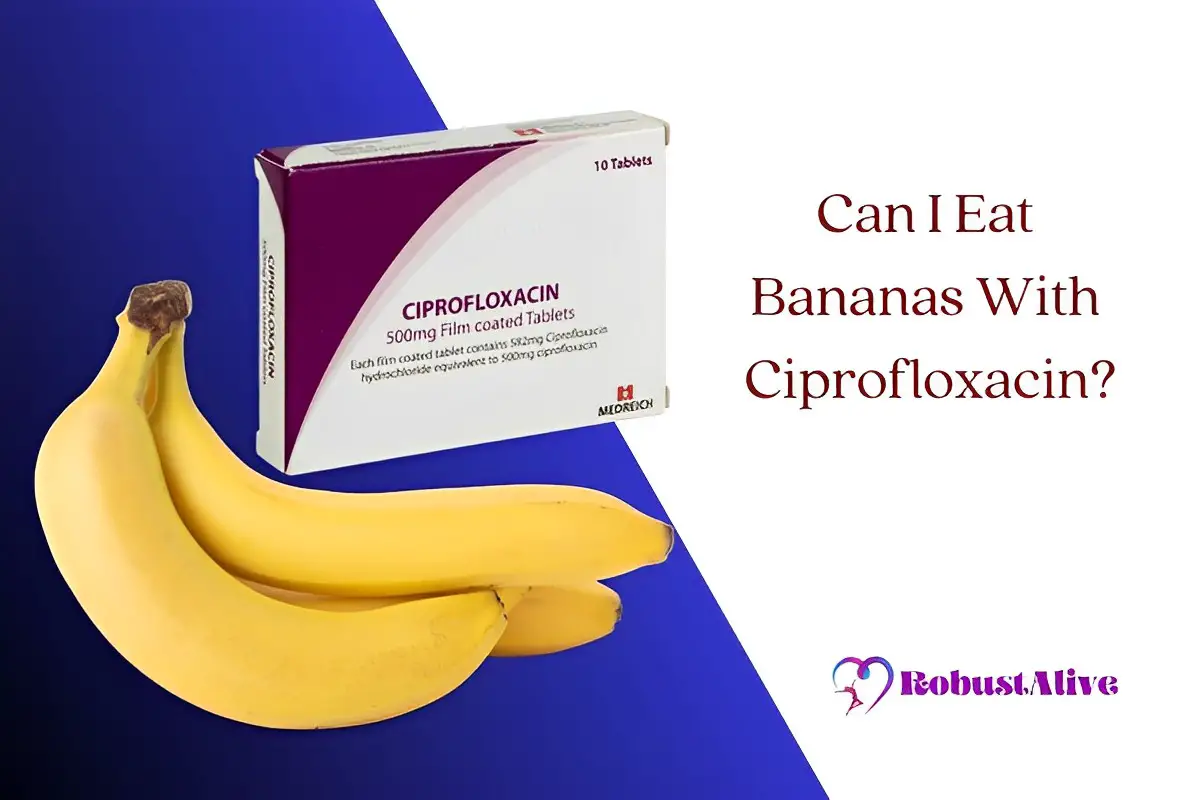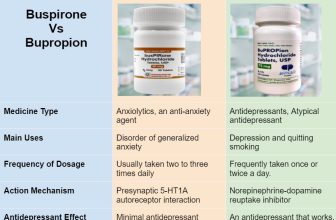Can I Eat Bananas with Ciprofloxacin? Find Out Here!

When taking medications, it’s crucial to be cautious about potential interactions and health risks. Ciprofloxacin, a commonly prescribed antibiotic for bacterial infections, is no exception. People often wonder if there are concerns about consuming bananas while on Ciprofloxacin.
So, can you eat bananas with Ciprofloxacin?
Yes, you can eat bananas while taking Ciprofloxacin. There is no known interaction between bananas and Ciprofloxacin that would affect the medication’s effectiveness.
To maximize its absorption and avoid potential interactions, take Ciprofloxacin on an empty stomach, 1 hour before or 2 hours after a meal.
This article will find out if eating bananas while taking Ciprofloxacin is safe and discuss any potential concerns or precautions to keep in mind.
What is Ciprofloxacin?
Ciprofloxacin is a medicine that belongs to a class of antibiotics called fluoroquinolones. It works by inhibiting the reproduction and growth of bacteria responsible for infections.
Ciprofloxacin is prescribed for various conditions, including urinary tract infections, skin infections, respiratory tract infections, and gastrointestinal infections.
| Generic Name | Ciprofloxacin |
| Brand Name | Cipro, Cipro XR, Cipro I.V., Cipro Cystitis Pack |
| Drug Class | Quinolones/Fluoroquinolones |
Interaction Between Bananas and Ciprofloxacin
The concern regarding consuming bananas while taking Ciprofloxacin stems from the belief that the fruit may interfere with the absorption or effectiveness of the antibiotic. However, there is no scientific evidence to support this claim. Bananas do not contain any known components that directly interact with Ciprofloxacin or impede its absorption into the bloodstream.
The Role of Drug-Food Interactions
While it is essential to be cautious about potential drug-food interactions, it is equally crucial to base these concerns on reliable scientific information. Certain foods and beverages can affect medication absorption, distribution, metabolism, or excretion, potentially altering their effectiveness or causing unwanted side effects. However, these interactions are usually specific to particular drugs and are not applicable to all medications.
Factors Affecting Ciprofloxacin Absorption
The absorption of Ciprofloxacin primarily occurs in the small intestine. Several factors can influence its absorption, such as the formulation of the drug, gastrointestinal pH, and the presence of certain substances.
However, bananas are not known to significantly alter these factors, suggesting they are unlikely to interfere with Ciprofloxacin absorption.
What are The Side Effects of Ciprofloxacin?

Graphics Credit: Robustalive.com
Here are some potential side effects of Ciprofloxacin:
- Nausea and vomiting
- Diarrhea or loose stools
- Abdominal pain or discomfort
- Headache
- Dizziness or lightheadedness
- Skin rash or itching
- Increased sensitivity to sunlight (photosensitivity)
- Joint or muscle pain
- Tendonitis or tendon rupture (particularly in the Achilles tendon)
- Ringing in the ears (tinnitus)
- Blurred vision or other vision problems
- Increased heart rate or palpitations
- Allergic reactions like hives, swelling, difficulty breathing
- Mood changes or confusion
It is important to note that not everyone experiences these side effects; some individuals may experience different or no side effects. If you are prescribed Ciprofloxacin and experience any concerning symptoms, it is recommended to contact your healthcare provider for guidance.
How Should You Take Ciprofloxacin?
To ensure the safe and effective use of Ciprofloxacin, please follow the guidelines below:
- Always follow the directions on the container label provided by your healthcare professional or the instructions included with the medication.
- For optimal results, take Ciprofloxacin on an empty stomach. This means taking it at least one hour before meals or waiting for at least two hours after a meal.
- Do not take Ciprofloxacin simultaneously with certain substances, as it may interfere with its absorption or effectiveness. Avoid taking it with the following:
- Antacids containing aluminum or magnesium.
- Sucralfate (brand name: Sulcrate).
- Iron supplements such as ferrous sulfate, ferrous fumarate, or ferrous gluconate.
- Calcium supplements.
- Antiretrovirals, which are medications prescribed for the treatment of AIDS.
Remember that this information serves as a general guideline. However, specific instructions may vary based on your individual circumstances and the directions provided by your healthcare provider.
What Not To Eat With Ciprofloxacin?
When taking Ciprofloxacin, it’s important to be cautious about what you eat and drink, as certain foods and beverages can have harmful consequences when combined with this antibiotic. Here are some things you should avoid:
-
Caffeinated Foods And Beverages
Avoid coffee, tea, soft drinks, energy drinks, and chocolate foods. Ciprofloxacin can amplify the stimulating effects of caffeine, leading to restlessness, nervousness, insomnia, heart arrhythmias, and anxiety.
-
Alcoholic Beverages
While you don’t have to abstain from alcohol completely, it’s advisable to limit or avoid alcoholic drinks while taking Ciprofloxacin. The side effects of the medication can be enhanced by alcohol, especially if it makes you feel dizzy.
-
Dairy And Calcium-fortified Foods
Avoid consuming high-calcium foods like dairy products and calcium-fortified foods at the same time as Ciprofloxacin. Calcium can interfere with the absorption of the antibiotic in the intestines, reducing its effectiveness. As a general guideline, avoid calcium-rich foods for two to six hours before taking Ciprofloxacin.
-
Minerals And Multivitamins
Ciprofloxacin can also interact negatively with certain minerals and multivitamins. It’s best to avoid nutritional items containing significant levels of zinc, magnesium, aluminum, and iron before taking Ciprofloxacin. These minerals hinder the absorption of the drug, diminishing its antimicrobial effects.
Refrain from taking these vitamins or mineral-enriched foods for two to six hours before taking Ciprofloxacin. It’s important to inform your doctor about any medications and nutritional supplements you are taking if you need to use Ciprofloxacin.
Ciprofloxacin Precautions
Here are some important precautions to keep in mind:
- Peripheral Neuropathy: Ciprofloxacin has been associated with peripheral neuropathy, a condition characterized by tingling, numbness, or pain in the hands or feet. If you experience these symptoms, you must notify your doctor immediately.
- Aortic Aneurysm: There is a potential risk of developing an aortic aneurysm (a bulge in the largest artery’s wall) while taking Ciprofloxacin. If you experience sudden chest, stomach, or back pain, have trouble breathing, cough, or hoarseness, seek medical attention promptly.
- Sun Sensitivity: Ciprofloxacin can make your skin more sensitive to sunlight, increasing the risk of severe sunburn, rash, redness, itching, or discoloration. To minimize this risk, it is recommended to avoid direct sunlight, especially between 10:00 AM and 3:00 PM. Wear protective clothing, such as a hat and sunglasses, and sunscreen with a minimum SPF of 15.
- Dizziness and Drowsiness: Ciprofloxacin may cause dizziness, lightheadedness, drowsiness, or reduced alertness in some individuals. It is essential to avoid activities that require mental alertness, such as driving or operating machinery, until you know how the medication affects you. If you experience bothersome reactions, consult your doctor.
- Hypoglycemia in Diabetic Patients: For individuals who take oral diabetes medications, Ciprofloxacin can cause low blood sugar (hypoglycemia). It is crucial to monitor your blood sugar levels closely and be aware of symptoms such as anxiety and behavior changes resembling intoxication, blurred vision, cold sweats, confusion, pale skin, difficulty concentrating, excessive hunger, headache, nausea, nervousness, rapid heartbeat, shakiness, unusual tiredness, or weakness. If you experience any of these symptoms, contact your doctor promptly.
- Drug Interactions: Inform your doctor about all the medications you are taking, including prescription, over-the-counter (OTC), herbal, or vitamin supplements. Ciprofloxacin can interact with certain drugs, potentially affecting their effectiveness or causing adverse effects. Your doctor will advise you on any necessary adjustments or potential drug interactions to avoid.
- Pregnancy: Inform your doctor if you are pregnant or planning to conceive. Ciprofloxacin might not be appropriate for use during pregnancy or in breastfeeding women.
It is important to follow these precautions to ensure your safety and optimize the effectiveness of ciprofloxacin treatment. Consult your healthcare provider for personalized advice if you have any concerns or questions.
Read More: Does Doxycycline Treat UTI?
Frequently Asked Questions (FAQs)
-
Can I Eat Eggs While Taking Ciprofloxacin?
Yes, you can eat eggs while taking Ciprofloxacin. There are no specific interactions or restrictions regarding the consumption of eggs with this medication.
-
Is It Ok To Eat Bananas After Taking Medicine?
Generally, it’s ok to eat bananas after taking medicine. However, if you’re taking certain medications like lisinopril or captopril (ACE inhibitors), eating a lot of bananas could give you too much potassium. These medications can already increase potassium levels, so combining them with high-potassium foods like bananas might lead to too much potassium in your body.
-
How Long To Wait Between Cipro and Dairy?
It is generally recommended to wait at least 2 hours between taking Ciprofloxacin and consuming dairy products or calcium-rich drinks to allow for proper absorption of the medication. This time gap helps prevent the calcium in dairy from interfering with the effectiveness of Ciprofloxacin.
Conclusion
In conclusion, no known interaction between bananas and Ciprofloxacin would affect the medication’s effectiveness. You can eat bananas with Ciprofloxacin. Remember to take the medication on an empty stomach for optimal absorption 1 hour before or 2 hours after a meal.
As always, consult your healthcare provider for personalized advice if you experience any concerning symptoms while taking Ciprofloxacin.






